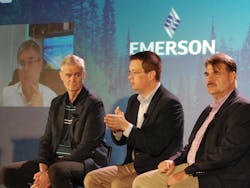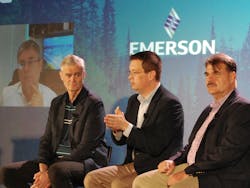Digitalization keeps carbon in check
The world has a traditional energy system that needs change. As Emerson’s chief sustainability officer, Mike Train, pointed out while opening a media briefing this week during Emerson Exchange in Grapevine, Texas, only about a third of the energy put into the current system “does what we want it to do.” The other two-thirds are wasted. And, with about three-fourths of carbon emissions stemming from the consumption of energy, that wasted energy flies directly in the face of increased efforts to hit net-zero pledges in countries and businesses around the globe.
“We need to start to turn pledges into progress,” Train said.
Most of the emissions come from industry, which makes up 32%, according to a chart presented by Train. Other culprits include agriculture (20%), buildings (18%), transportation (17%) and mining (9%). Emerson, which is committed to its own net-zero goals in all three scopes by 2045, touches most of these sectors with its technology. While working with its partners and customers to tackle the dual challenges of cutting emissions while demand for energy consumption increases, Train said he believes many companies are very committed to making changes.
During a 90-minute session, Emerson customers presented their plans and progress for addressing the energy transition through digitalization.
Digital from the start
Origin Materials, which seeks to turn carbon found in biomass into useful materials, was first to state its case to the assembled media and analysts on hand. Roman Wolff, vice president of engineering, said, “Origin enables the transition to carbon-negative materials.”
The company converts waste from bio feedstock, such as wood chips and whole cane, and converts it into products such as bottles, paints and clothing. Among its customers are Pepsi and Nestle. While the very nature of its business is designed to contribute to net-zero gains around the world, Wolff said most of its own emissions come from the manufacturing process. That fact set the company forth on a digital path.
The company is building its first world-class plant in Geismar, La. It’s the first of many, according to Wolff. Those plants will contribute greatly to the reduction of emissions in its operational processes, he said. “We are on a journey to operational excellence via automation. We want our plants to run safer, greener, longer and faster,” he continued.
While the journey to digitalization generally takes several years, Wolff said the company “wants it to happen now.” He said one way to “jump to the front of the line” was to implement Emerson’s integrated portfolio of automation technologies. He added that the Emerson partnership allows Origin to bring the capex of its plant projects down as well as to fast track their schedules.
“We believe that digital automation is a strategic lever for growth, and we want to establish a solid digital foundation,” he said.
Origin isn’t the only one banking on a digital foundation for its manufacturing facilities. PureCycle Technologies, an Orlando, Fla.-based start-up aiming to change the way plastics are recycled, is also investing in digital automation in its facilities. Dustin Olson, CEO, said the company has a distinct advantage because it can build its facilities smart from the get-go.
When it comes to industry, Olson said, “In order to do things differently we have to change how we operate.” That starts with operations.
Digital transformation
Olson said the digitalization process for PureCycle was easier than for many companies. “When you get to start from scratch, it’s fun. The transformation is the hard part,” he said. That’s why the company lives by the mantra “born digital.”
“The first step we took in the right direction was deciding to be digital out of the gate,” he continued. “Boards [of directors] are typically most interested in value, capex offset by the value created. When we looked at the incremental capex required to be ‘born digital’ versus traditional it really wasn’t that much. I think it’s much more difficult if you have to transition.”
On the other side of that coin, Braskem Idesa, a Mexico-based petrochemical company, has been maneuvering the tougher digital transformation path. “It’s not a simple process, we have a lot of stakeholders,” said CEO Stefan Lepecki. “Our partnership with Emerson was crucial.”
Lepecki said the company, which is the sixth largest petrochemical company in the world, added that the key to navigating the arduous process of digital transformation at such a large entity is a buy-in culture and a clear plan.
“First, we have to have the clear priority at the highest level of the company,” he said. “At Braskem Idesa, the board of directors has a very clear vision. That is, we must have a sustainable company, providing sustainable solutions. This is very clear.
“I reinforce that is it more than technology. To make sustainability such a priority takes a culture,” he continued.
“It’s a process of change,” said Train, adding that Emerson’s automation expertise stands ready to play a central role in sustainable transformation across multiple industries.
Get the best of Emerson Exchange Americas 2022
When the event comes to a close, the best, most important coverage will be compiled into a report. Register now to pre-order the report and be among the first to receive it in your inbox.



